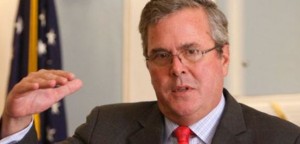 Jeb Bush may or may not seek the presidency in 2016, but those who dismiss his education foundation as a political prop are simply out of touch. What the Foundation for Excellence in Education is showing once again, with its fifth annual national summit, is that it is creating a sense of urgency and national purpose around our most fundamental commitment to each new generation.
Jeb Bush may or may not seek the presidency in 2016, but those who dismiss his education foundation as a political prop are simply out of touch. What the Foundation for Excellence in Education is showing once again, with its fifth annual national summit, is that it is creating a sense of urgency and national purpose around our most fundamental commitment to each new generation.
A new Reuters report, released as the conference got underway Tuesday, seemed so eager to minimize Bush’s education credentials and disparage his motivations that it actually seemed to hold him responsible for Florida test scores that dropped five years after he left the Governor’s Mansion. It then portrayed his foundation as fueled with “cash and clout” and his current agenda as “contentious.”
Listen, Bush, as governor, was no shrinking violet. He used taut partisan muscle to accomplish most of his major reforms, including the grading of public schools and the creation of the state’s first voucher in 1999, and some public educators still have the scars to show for it. But there is no disputing its impact on Florida schoolchildren, and his work through the foundation since he left office has evolved in meaningful ways. Bush has fostered an increasingly bipartisan and markedly civil campaign to improve public education. He also brings the kind of detailed policy knowledge that enables him to be viewed, no matter the setting, as one of the true adults in the room.
The Bush who opened the conference on Tuesday could hardly be described as contentious and certainly not partisan. He thundered about the lost opportunities for children of poverty, our moral commitment to those for whom the American Dream is becoming illusory, the complacency of parents whose children attend “fancy-pants high schools,” and the urgent need for bipartisan consensus on education reform (referring to his foundation as “center-right, I guess”). He even invoked Robert Caro’s biography of LBJ, speaking admiringly of how a suddenly elevated President Johnson used forceful leadership in 1964 to pass the Civil Rights Act.
As my colleague Ron Matus noted yesterday, this summit itself rises above partisanship. It brings together prominent Republican and Democratic thinkers, and invites them to agree and disagree in respectful ways. When Bush was asked to react to former Clinton Chief of Staff John Podesta’s description of the proper federal role in education, he described his disagreement as “at the margins” and explained how he would attempt to make Title I more accountable. Bush then reached back for common ground, adding: “Education ought to be something of great national importance.” When former Clinton counsel Joel Klein and former George W. Bush secretary of state Condoleezza Rice were asked to name the single most important catalyst for positive educational change, they answered as one: parental choice.
Those of us who watched Bush lose his first race for governor in 1994 know that he created a foundation then in part to keep his political fortunes alive until he got his second chance in 1998. But whether he takes the next step toward the White House in 2016, what he is doing these days is genuine and heartfelt. It also is to be admired. He is bringing together people of different political stripes who view the transformation of public education as a national imperative. That’s heady stuff.


